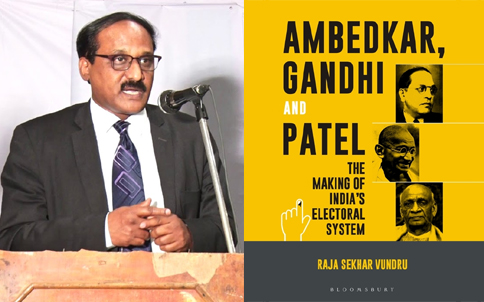Book Review:
Ambedkar, Gandhi and Patel: The Making of India’s Electoral System (written by Rajasekhar Undru) has many interesting twists and many aspects that disappeared in the history. Just a few important ones here in brief:
1. Muslims have reservation and separate electorate in the legislative assembly since 1909. Congress leader Tilak, Muslim league leader Jinnah made a better and crucial deal in 1916. The same Lucknow deal has become famous. There is no interference in this agreement by Gandhi who returned to India a year before that. He didn’t oppose it.
2. Ambedkar 1919 attended the South Borough Commission for the first time and asked for civil rights and the representation for the Dalits in the legislative assembly. For the first time he demanded the right for every adult to vote. Even in Britain and America, at that time, not everyone had the right to vote.
3. In the1920 elections, for the first time there was a chance to represent all groups in the legislative assembly. But the Congress didn’t participate in those elections as Gandhi took over the co-operation movement. Congress has also opposed the Simon Commission appointed by the British government to recommend more election reforms. Jinnah and Ambedkar cooperated with commission. The Congress has painted Ambedkar as a British ‘s Thottu ‘ and ‘ Traitor ‘.
Motilal Nehru committee appointed by Congress in 1928 for new constitution.
4. Motilal called everyone for discussions but did not invite Dalit representatives. There were suggestions that the Dalits can be represented by a private electorate, or nomination, but the report says it is impossible. Simon commission report came in.
5. Simon Commission said minorities should continue as private electorate. The Dalits were first identified as a special political group.
6. Round table meetings started in London in 1930 to determine the future of India’s Constitution. This took place three times between 1930-32. Ambedkar has participated in all the three round table conferences. Gandhi took part in the second conference. Ambedkar won in the first phase conference in taking the Dalits issue to the attention of the British government. He has been recognized internationally as a Dalit leader.
7. Gandhi, who thought he was the only representative of the Dalits, has been observing this evolution. He spoke to Ambedkar for the first time in August 1931 after he decided to participate in the second round table conference. Till now, Gandhi thought Ambedkar was a progressive Brahmin fighting on behalf of Dalits. He came to know that he is a Dalit. He strongly told Ambedkar, “ I do not agree to separate Dalits from Hindus.” This is how the clash between the two started.
8. The first round table conference agreed to special representation of minorities (Muslims, Indian Christians, Sikhs, Dalits, Anglo Indians, Europeans) in legislative assembly. Gandhi who participated in the second round said that he will not agree to give special treatment to anyone except Hindu-Muslim-Sikhs. He described it as necessary evil to give special representation to Muslims and Sikhs.
9. Dalits are also identified as minorities. Gandhi also tried to bring about split between other minorities and Dalits. If you stop supporting Dalits, Congress will accept your demands. But other minorities stood solidly by the Dalits. Gandhi lost the game altogether.
10. Ambedkar and Gandhi signed saying that Prime Minister McDonald would deal with the problem.
11. The British government announced the popular award as the Communal Award. As Ambedkar desired, Dalits got separate electorate, two votes (one under private electorate, another under general constituency) in it. Separate electorate was granted to the other minorities as well. By then Gandhi, who was in Eravada jail in Pune, started hunger strike against this award. Gandhi didn’t care that he also agreed and signed to leave the Prime Minister’s decision. The whole country is tensed with it. Pressure on Ambedkar has increased to compromise. It is not wrong that he agreed to save Gandhi’s life. Tej Bahadur Sapru has approved a compromise formula with secondary election, suggested by Sapru with some changes. Ambedkar’s another indication is to go for a referendum among the Dalits regarding continuation of reserved seats after 10 years. Gandhi said five years is enough. Rajagopalachari intervened and agreed to postpone the referendum to a future date.
12. Nehru was in Dehradun jail when all this was happening. Anyway, he has never shown interest in the issues of Dalits. Ambedkar criticised Nehru also in this regards.
13. When all this was happening, although Sardar Patel was staying very close to the jail he did not participate in the discussions. Nehru’s silence continued even after Gandhi’s assassination.
14. Patel has taken matters into his own hands.The country’s division has brought a huge change in the climate. Not only special representative of minorities, Patel has thought of abolishing the representation of Dalits as well. Now there is no scheduled castes, untouchable has been cancelled, we are all same nanna has brought forward the argument.
15. SC members like J, Khandekar also saluted him. He became lonely as not one of the 30 SC members of the Constituent Assembly supported him. Patel tried to make it appear as though the minorities said that they don’t want special representation. Finally, the special representation of other minorities, including the Muslims, through the dual constituencies, have been cancelled.




